Justin Wolfers recently published a piece in the New York Times in which he describes the results of a study about discrimination by local public officials in the US. I was going to publish a post about gun control, but it turned into something much longer than what I initially planned and people have already moved on to something else after Las Vegas, so I’ll take my time to finish it and want to talk about this study instead. Here is how Wolfers summarizes the main result:
A team of economists has uncovered persuasive evidence that local government officials throughout the United States are less responsive to African-Americans than they are to whites.
The researchers sent roughly 20,000 emails to local government employees in nearly every county. The emails posed commonplace questions, like “Could you please tell me what your opening hours are?”
The emails were identical except that half appeared to come from a DeShawn Jackson or a Tyrone Washington, names that have been shown to be associated with African-Americans. The other half used names that have been shown to be associated with whites: Greg Walsh and Jake Mueller. The email sent to each local officeholder was determined by chance.
Most inquiries yielded a timely and polite response. But emails with black-sounding names were 13 percent more likely to go unanswered than those with white-sounding names. This difference, which appeared in all regions of the country, was large enough that it was statistically unlikely to have been a matter of mere chance.
The study also found that emails sent by people with black-sounding names were less likely to receive a polite answer.
Immediately after this article went up, my social media feed was full of people declaring this study yet another proof of the hold that “white supremacy” still has on American society, such as this gentleman.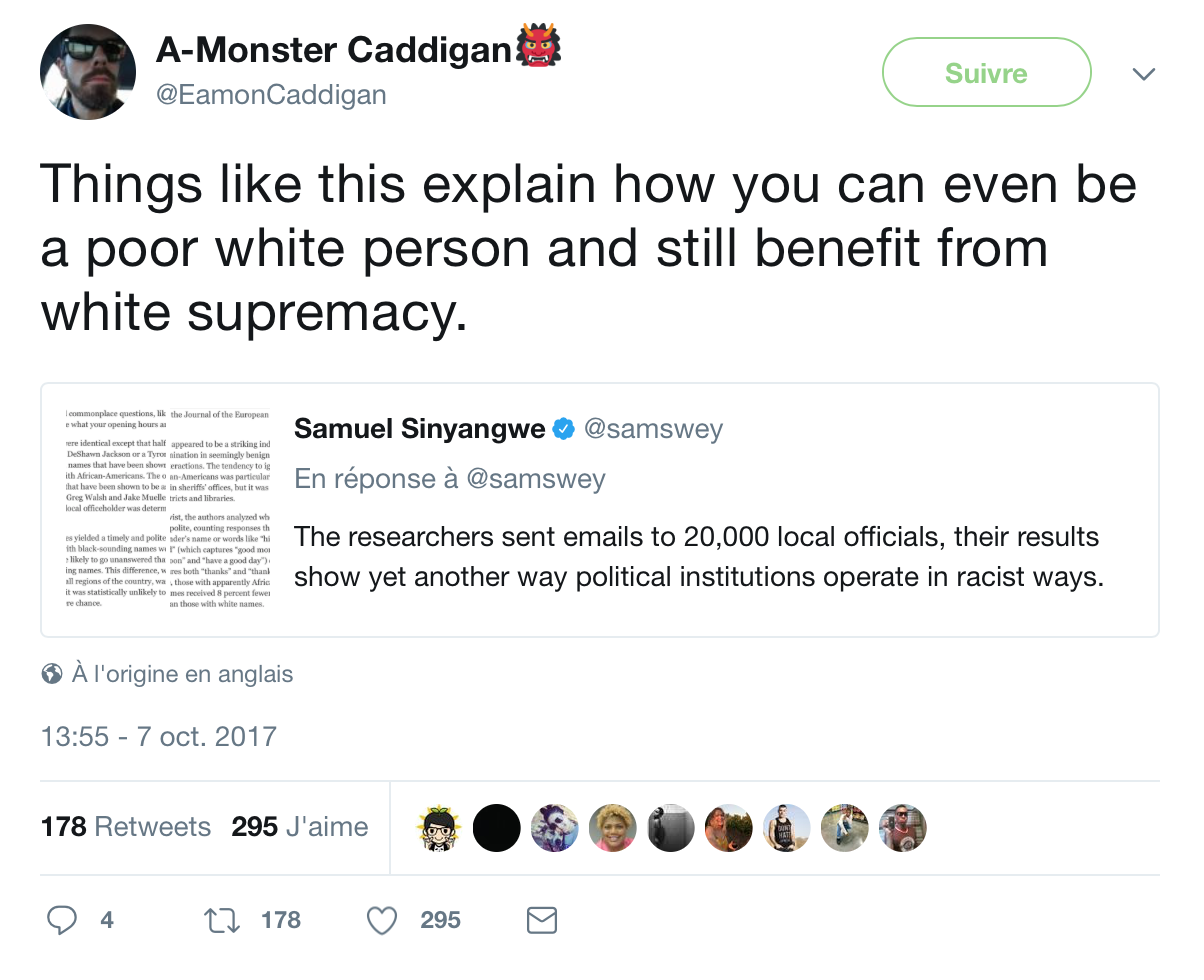 The way in which the concept of white supremacy, among many others, has been expanded in recent years, to the point where it has been completely trivialized, is really a striking phenomenon.
The way in which the concept of white supremacy, among many others, has been expanded in recent years, to the point where it has been completely trivialized, is really a striking phenomenon.
Of course, plenty of people also grossly distorted the results of the study, such as William Easterly here. Actually, despite what Wolfers claims, the study absolutely does not support Easterly’s categorical statement and, since both of them are professors of economics at prestigious universities, they are presumably intelligent enough to understand that. But in the current environment, you are more likely to move up in the world if you constantly exaggerate the effects of racism (which by the way is a bit weird, given that we’re supposed to live in a white supremacy), so that’s what they do.
Actually, despite what Wolfers claims, the study absolutely does not support Easterly’s categorical statement and, since both of them are professors of economics at prestigious universities, they are presumably intelligent enough to understand that. But in the current environment, you are more likely to move up in the world if you constantly exaggerate the effects of racism (which by the way is a bit weird, given that we’re supposed to live in a white supremacy), so that’s what they do.
If you want to know exactly what the study found, here is the passage of the paper where its authors describe the main result, which shows clearly that Easterly’s statement is false:
Emails signed by white-sounding names (we will refer to them as “white emails” hereafter) receive a response in 71.66% of the cases, while those signed by black-sounding names (henceforth: “black emails”) in only 67.96% of the cases, with the difference of 3.7 percentage points being strongly statistically significant (z-stat, p-value <0.000).
So both whites and blacks receive a reply to their emails in the vast majority of cases, but there is a difference of 3.7 percentage points between the rate at which black people receive a reply and that at which white people do. Actually, for reasons I will explain below, the study doesn’t even show that, but let’s assume it does for the moment. The authors also performed a regression using linear probability models with state fixed effects and controlling for a variety of socio-economic characteristics at the county-level, but it had essentially no effect on the effect size, which ranges between 3.2 percentage points and 3.8 percentage points depending on the model.
One way to describe this result is to say, as Wolfers did, that blacks are about 13% more likely not to receive a reply to their email. Another, equivalent way to describe the same result is to say that blacks are approximately 5% less likely to receive a reply to their email. Now I wonder why Wolfers chose to describe the result in this way… Of course, precisely because the result looks pretty different depending on what risk ratio you give to describe it, the honest thing to do was to report it as the authors of that study did in the paper. But Wolfers wasn’t concerned with honesty, he was trying to make a point, so he didn’t. Even if the difference of 3.7% between the rate at which black people receive a reply and that at which white people do were actually the product of racial bias, which as we shall see is unlikely, it’s so small that it would hardly justify the hysteria about “white supremacy” and “institutional racism” that Wolfers’s article generated.
The authors of the study try to argue that the discrimination they believe to have discovered could have serious adverse psychological effects:
Experiencing even relatively small episodes of discrimination in a specific domain may erode the trust that an individual has in government institutions in general, potentially leading to the development of an “oppositional culture” with negative consequences, for instance, in terms of educational achievement (Fryer and Torelli, 2010). Furthermore, the medical and psychological literature provides ample evidence of the negative effect of discrimination on physical and mental health (Harrell et al., 2003), including so-called racial micro-aggressions, i.e., subtle everyday experiences of racism (Wong et al., 2014).
But this is not very serious, because the effect size they found, even if it were real, could hardly be detected by black people in their interactions with public officials. If we take their result at face value, it means that when a black person and a white person both email a public official, the probability that the white person but not the black person receives a reply is about 23%, whereas the probability that the black person but not the white person receives a reply is about 19%. Even a very observant black person, who has a lot of white friends, would never detect the effect found in that study.
The authors of the study also suggest that it contradicts the claim that reverse discrimination has become quite common:
Despite a rising sentiment among whites that the so-called reverse discrimination is on the rise in the U.S. (Norton and Sommers, 2011) due, for instance, to affirmative actions, what we find is evidence of discrimination against African Americans by public service providers.
It’s funny they would make that claim, when in fact pro-black discrimination, while probably benefiting mostly middle-class/upper middle-class blacks, is pervasive. Indeed, while studies about anti-black bias that are well-designed generally find either no bias at all, small effects or ambiguous results, the existence of a huge pro-black bias in a variety of settings has been documented over and over. When I say that, my liberal friends always think it’s ridiculous, so here are a few examples to bring them back to the real world.
First, according to this paper from 2004 (which I already mentioned in my politically incorrect guide to affirmative action), the odds of being admitted to an elite university are about 550% higher if you are black once you control for a variety of relevant characteristics.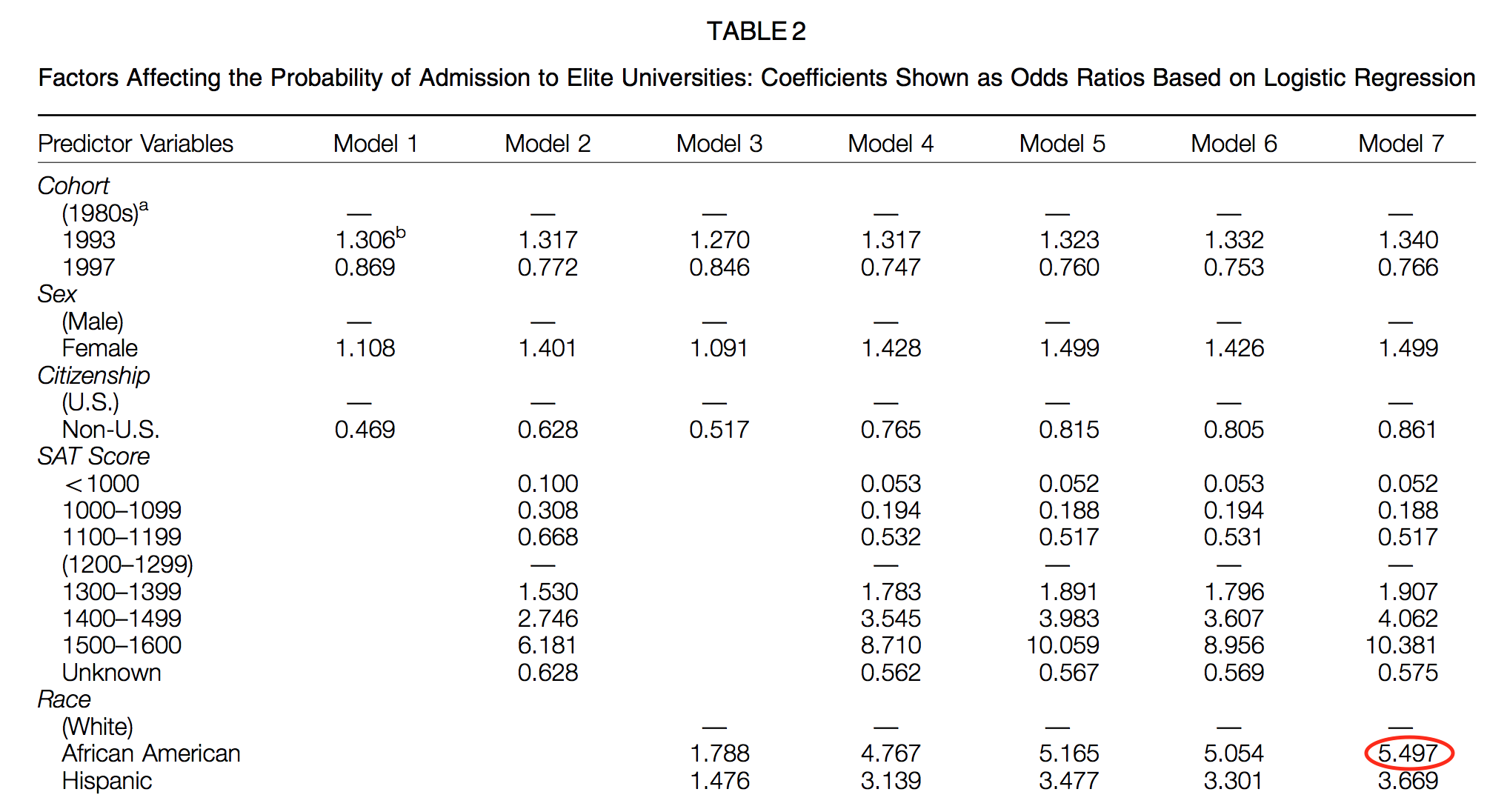
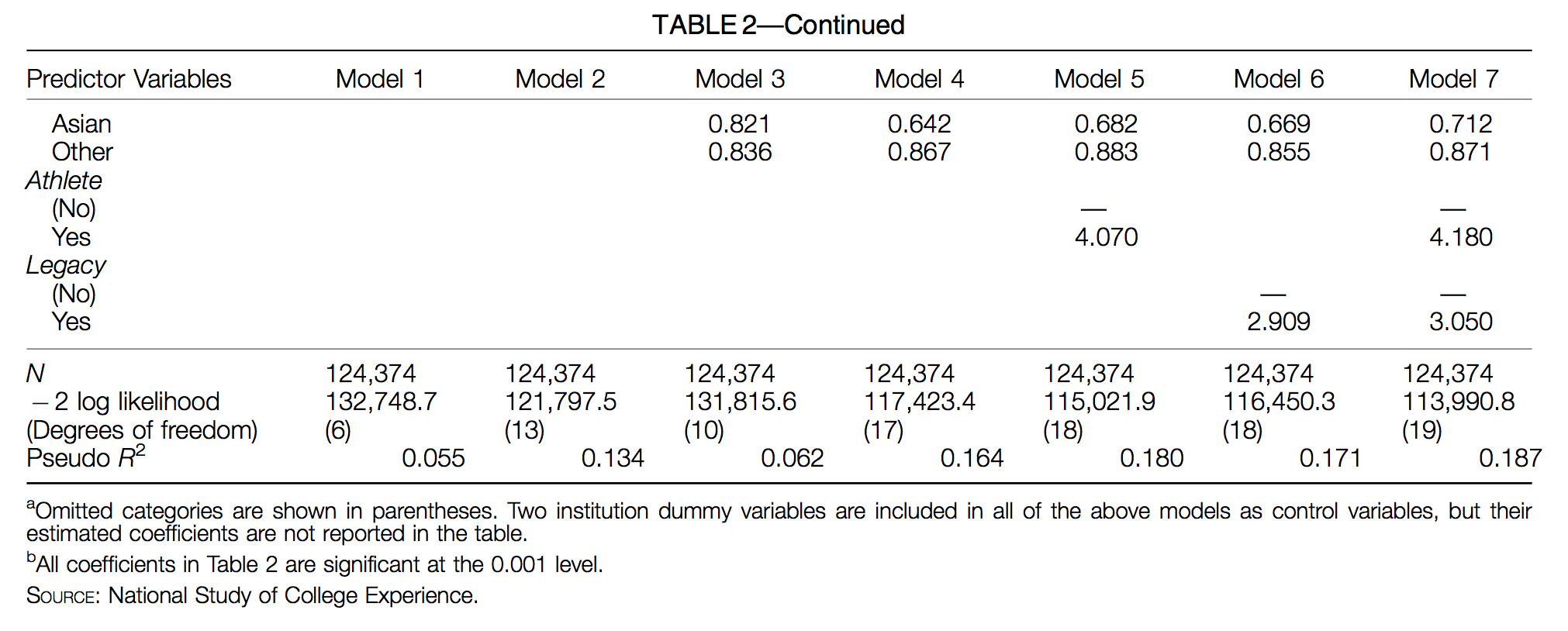
 Since the admission rate at Harvard is about 5%, if we evaluate the probability ratio at this point, it means that keeping a variety of other variables constant, a black applicant is approximately 4.5 times more likely to be admitted than a white applicant. (The effect is no doubt stronger for weak applicants and weaker for strong applicants. If you are not familiar with odds ratios, which are not very intuitive, you can read this paper. I haven’t actually read it, but I had a brief look at it and it looks pretty good. If you want to know how to derive a formula to convert odds ratios to probability ratios, once you have defined odds in terms of probability, it only takes a few trivial algebraic manipulations.) This effect is more than 34 times larger than the effect found in the study about discrimination by public officials, when I use the larger risk ratio presented by Wolfers, i. e. the one for a non-reply.
Since the admission rate at Harvard is about 5%, if we evaluate the probability ratio at this point, it means that keeping a variety of other variables constant, a black applicant is approximately 4.5 times more likely to be admitted than a white applicant. (The effect is no doubt stronger for weak applicants and weaker for strong applicants. If you are not familiar with odds ratios, which are not very intuitive, you can read this paper. I haven’t actually read it, but I had a brief look at it and it looks pretty good. If you want to know how to derive a formula to convert odds ratios to probability ratios, once you have defined odds in terms of probability, it only takes a few trivial algebraic manipulations.) This effect is more than 34 times larger than the effect found in the study about discrimination by public officials, when I use the larger risk ratio presented by Wolfers, i. e. the one for a non-reply.
The same phenomenon can be observed for admissions at medical schools, for which data are released every year by the Association of American Medical Colleges. As you can see in this table made by Mark Perry of the American Enterprise Institute, black applicants with an average GPA and MCAT are almost 3 times more likely to be admitted to medical school than a white applicant with the same credentials. This effect is more than 21 times larger than the effect found by the study on discrimination by local government officials.
As you can see in this table made by Mark Perry of the American Enterprise Institute, black applicants with an average GPA and MCAT are almost 3 times more likely to be admitted to medical school than a white applicant with the same credentials. This effect is more than 21 times larger than the effect found by the study on discrimination by local government officials.
The same thing is also true for law school, as you can see in this graph, which I found in a paper from 2008.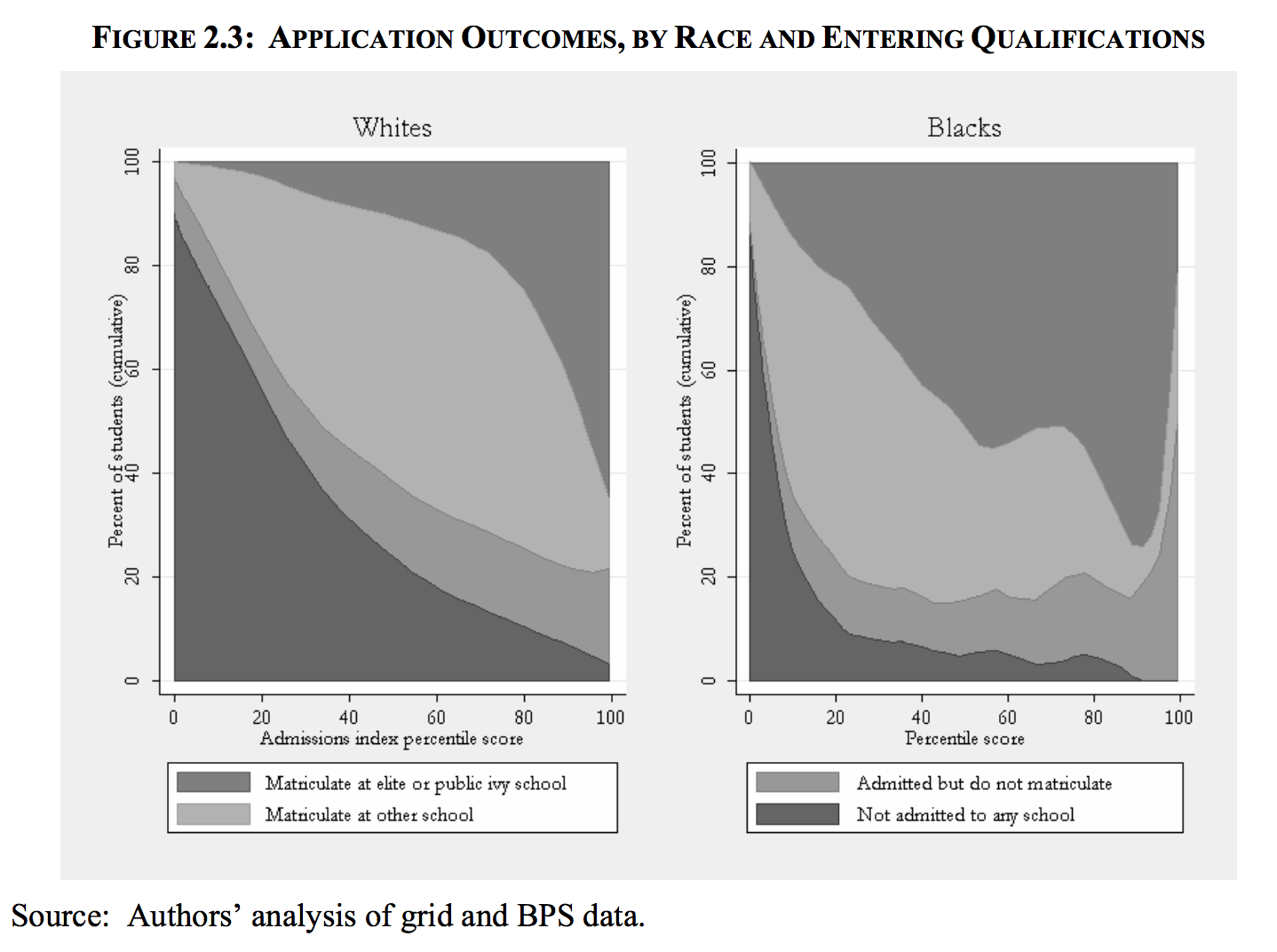 This graph is a bit difficult to read, but just eyeballing it, you can see that a black applicant whose academic qualifications are average (the admissions index score is calculated by combining LSAT with GPA) is about 35% more likely than a white applicant with the same academic qualifications. This effect is about 3 times as large as the bias found in the study on discrimination by public officials. For elite schools, the difference is much larger, since a black applicant with average credentials is about 5 times more likely to be admitted than a similarly qualified white applicant. This effect is about 38 times larger than the effect found in the study about local government officials.
This graph is a bit difficult to read, but just eyeballing it, you can see that a black applicant whose academic qualifications are average (the admissions index score is calculated by combining LSAT with GPA) is about 35% more likely than a white applicant with the same academic qualifications. This effect is about 3 times as large as the bias found in the study on discrimination by public officials. For elite schools, the difference is much larger, since a black applicant with average credentials is about 5 times more likely to be admitted than a similarly qualified white applicant. This effect is about 38 times larger than the effect found in the study about local government officials.
This pattern doesn’t stop at school, but can still be observed after people graduate. For instance, based on survey data, this paper shows that large law firms (defined as offices with at least 100 attorneys) have a significant preference for black associates at entry level.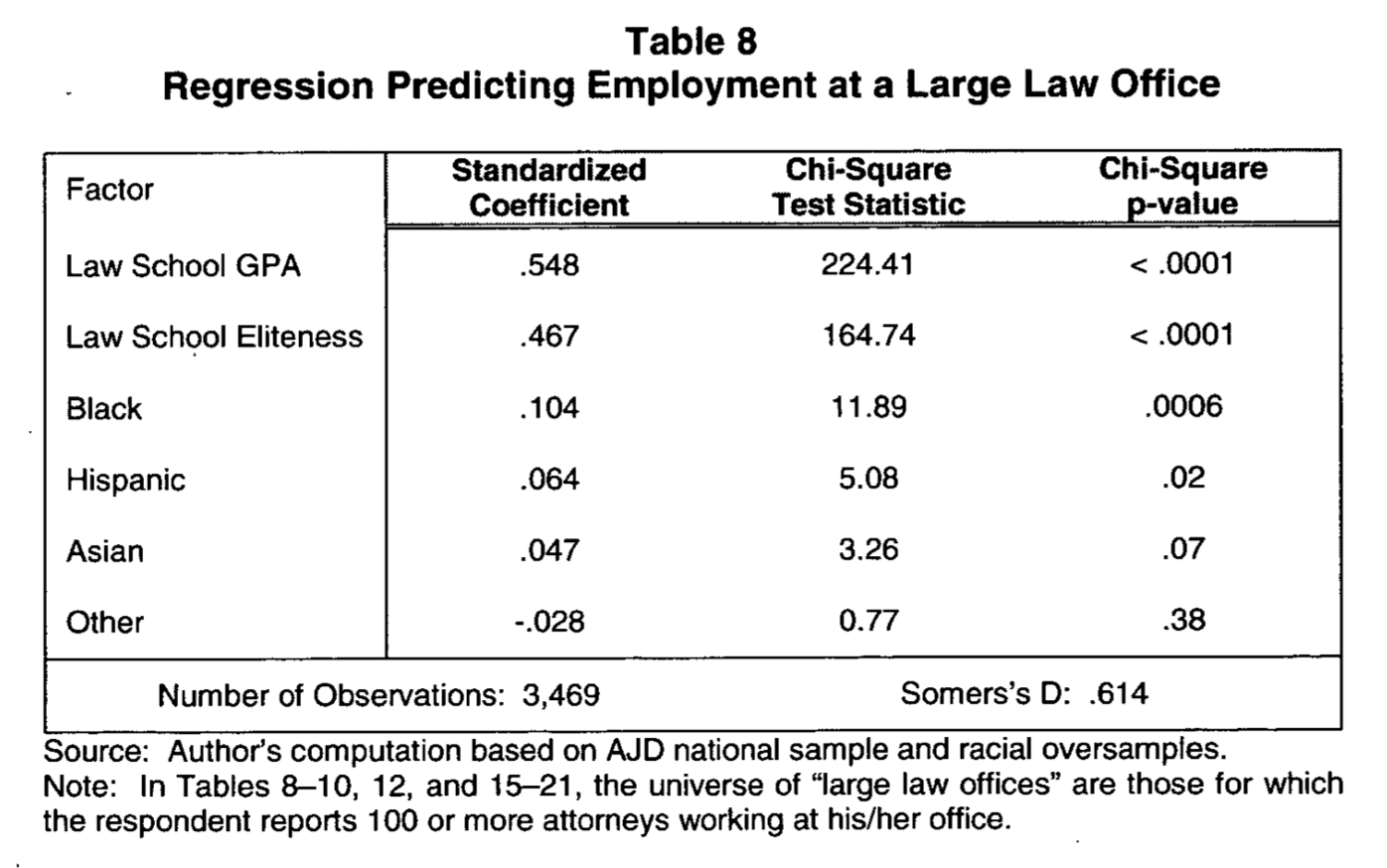 This means that, even controlling for the GPA of associates in law school and whether they graduated from an elite law school, the effect of race for black is still 1/10 of a standard deviation. The paper also shows that black students in law school regard work in a large firm as slightly more desirable than white students, which may somewhat inflate the coefficient for blacks, but the difference is so small that I doubt it can explain most of it. In order to know for sure, we’d have to use data collected directly from law firms, but this would be very hard.
This means that, even controlling for the GPA of associates in law school and whether they graduated from an elite law school, the effect of race for black is still 1/10 of a standard deviation. The paper also shows that black students in law school regard work in a large firm as slightly more desirable than white students, which may somewhat inflate the coefficient for blacks, but the difference is so small that I doubt it can explain most of it. In order to know for sure, we’d have to use data collected directly from law firms, but this would be very hard.
This is smaller than for admissions in law school, though still practically meaningful and statistically significant, but this actually understate the racial preference in favor of blacks in hiring at large law firms, where the median wage is much higher than in smaller firms. First, this regression is based on data from a survey that people take a few years after they graduated, but as the author of this paper points out, the rate of attrition at law firms is much higher for blacks than for whites. This presumably means that the coefficient in the figure I reproduced above underestimate the preference of large law firms for blacks, especially since the associates who leave in the first 2-3 years are presumably more likely to have a low GPA and not to come from an elite law school. Indeed, when the author performs the same regression on a dataset based on a survey taken immediately after graduation, he finds a standardized coefficient of 0.18, i. e. nearly twice as large. Moreover, the analysis also shows that whether you graduated from an elite law school had a very large positive effect on your chances of working in a large law firm, but we have also seen that elite law schools had a huge preference for blacks in admissions. So, in the case of blacks, the preference for applicants from elite law schools on the part of large firms is to a large extent de facto a preference for blacks. So the preference for blacks on the part of large law firm is still significantly larger than the bias found by the study about local government officials. However, according to this paper, it seems to be limited to large law firms. Race does not seem to be a factor in hiring for smaller law firms.
Note that, unlike many American liberals, black associates in large law firms seem to be well aware of the existence of such racial preferences, as the results of a survey which can be found in the same paper show.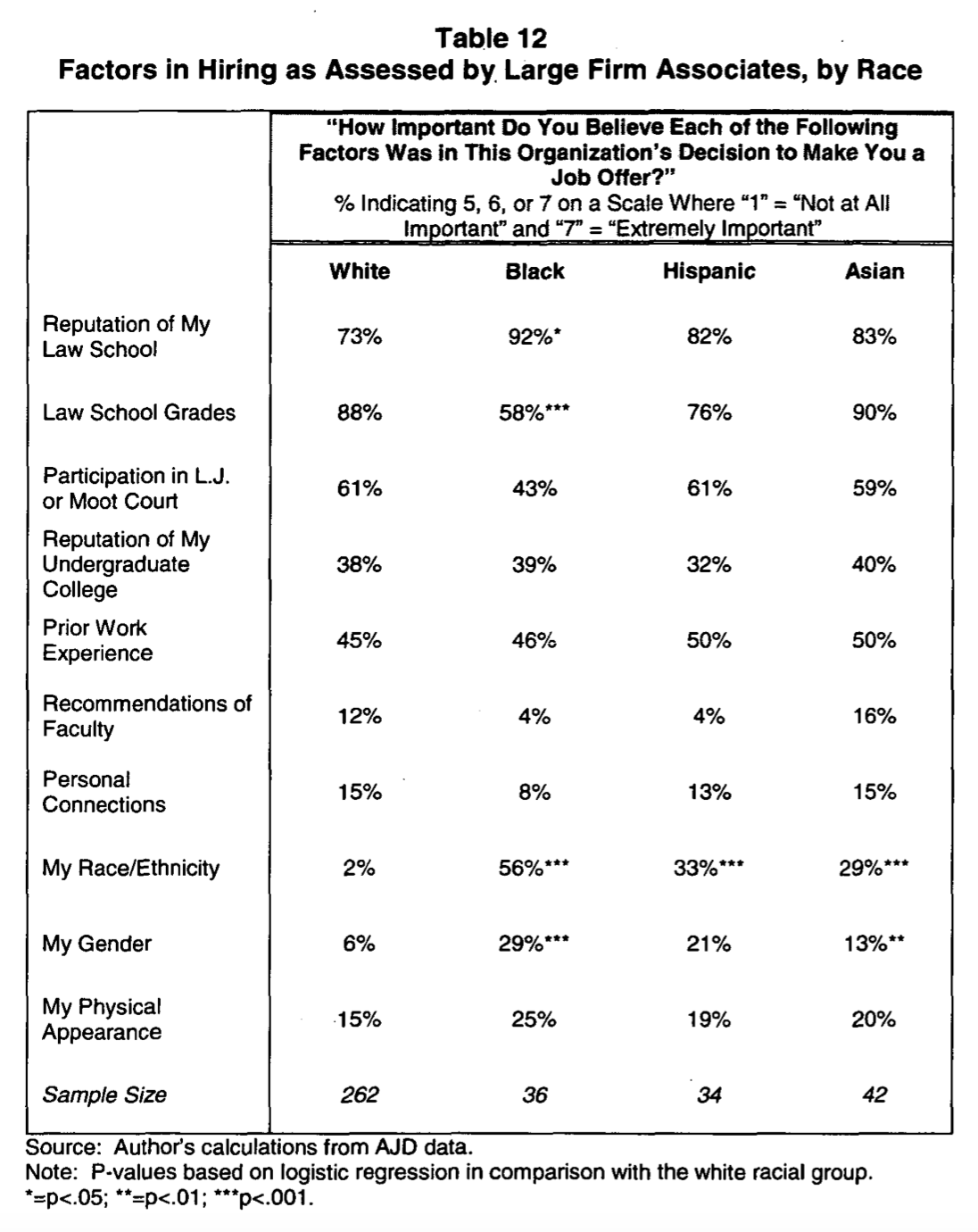 It is true that, unlike the effect found in the study about discrimination by public officials, the effect of race in hiring at large law firms is probably large enough to be detected easily.
It is true that, unlike the effect found in the study about discrimination by public officials, the effect of race in hiring at large law firms is probably large enough to be detected easily.
Anyway, I could probably go on like that for a while, but you should get the idea by now. The authors of the study Wolfers talked about in the New York Times found it surprising, in view of their result, that many Americans believe that reverse discrimination, i. e. anti-white discrimination, has become common in the US. But this is just because, unlike them apparently, many Americans don’t live in a parallel universe. As I said above, anti-black bias, while it no doubt exists and has adverse effects on the well-being of black people, is usually extremely modest and only explains a relatively small part of the various black/white disparities that can be observed in US society. On the other hand, a very large pro-black bias exists in a variety of settings, although it presumably benefits mostly middle-class/upper middle-class blacks. (The fact that black people in the US have a very different experience depending on their socio-economic status is another important fact which is obscured by the obsession of American liberals with race. This is true despite the fad of “intersectionality”, which in practice mostly serves to make everything about race.) We live in a world where the whole elite, from CEOs to movie stars, but also journalists, academics, etc., is constantly pandering to antiracist nonsense, where antiracism has become a multi-billion dollar industry (just consider that Google alone has spent $265 million to promote “diversity” since 2014), but somehow liberals still believe white supremacy reigns supreme.
If they really want to help black people, liberals should try to remedy factors that are responsible for a much larger part of the various black/white disparities they regularly complain about. For instance, they could do a lot more to promote policies that would reduce segregation, which in my opinion explains a lot more than racism. (Coincidentally, the author of the study I used above to estimate racial preferences in law school admissions co-authored a paper on the effect of segregation on the black/white gap in test score gap, which found that it explains almost 1/4 of it. Of course, you may think that segregation has a lot to do with anti-black bias today, but I actually think that a combination of anti-black bias in the past and preferences about the racial composition of neighborhood among different groups explains a lot more. I want to write about this eventually, but this issue deserves its own post, so I will leave it at that for now.) In any case, what they definitely shouldn’t do is write nonsensical articles about the magical powers of “whiteness” or claim the US is a “white supremacist” society because a study found a very small bias against black people on the part of local government officials. Especially since, as I will argue in the rest of this post, the study in question doesn’t even show that.
I have already shown that, even if you take the results of that study at face value, they only indicate a very small bias against black people on the part of local government workers. But I will now explain why we shouldn’t take them at face value. As we have seen, in their experiment, the authors of the study found that emails sent by someone with a typically black name were less likely to receive a reply than emails sent by someone with a typically white name. But it doesn’t mean that racial animus on the part of the recipients explains that effect. The authors understand that, but their discussion of this problem is a bit confused. They correctly point out that, if people with a typically black name receive a reply less often, it could be because recipients use their names to infer a characteristic relevant to their decision to reply other than race. In particular, they make the hypothesis, which as we shall see they eventually reject, that since the typically black names used in the experiment (i. e. “DeShawn” and “Tyrone”) are also typically lower-class, recipients could use these names to infer the senders are lower-class and reply less often because lower-class people typically require more help, are less likely to complain if they are ignored, etc.
This is correct, but that’s not all. It could also be that black people, independently of their socio-economic status, typically require more help, are less likely to complain if they are ignored or whatnot and recipients take that into account to decide whether they are going to reply. In that case, the recipients would be sensitive to race insofar as it correlates to other characteristics that are relevant to their decision-making, but the fact that people with typically black names are less likely to receive a reply would not be driven by racial animus. It could also be that, if people with typically black names are less likely to receive a reply, it’s again because recipients use the names to infer socio-economic status, although not because lower-class people typically require more help or whatnot but simply because recipients are driven by class-based animus. So we have at least four different possible explanations of the results found by that study:
- Local government officials in the experiment replied to emails sent by people named “DeShawn” or “Tyrone” less often because these are typically black names and they don’t like black people.
- Local government officials in the experiment replied to emails sent by people named “DeShawn” or “Tyrone” less often because these are typically black names and, even when you control for their socio-economic status, black people require more help, are less likely to complain if they are ignored, etc.
- Local government officials in the experiment replied to emails sent by people named “DeShawn” or “Tyrone” less often because these are typically lower-class names and they know that lower-class people require more help, are less likely to complain if they are ignored, etc.
- Local government officials in the experiment replied to emails sent by people named “DeShawn” or “Tyrone” less often because these are typically lower-class names and they don’t like lower-class people.
Of course, these are not mutually exclusive, since it’s possible that each explains part of the effect observed in the study. Moreover, it’s not clear that 2, 3 and 4 would be any better than 1, but they are different and should be distinguished.
When they consider alternative explanations of the data, the authors of the study focus on 3 and try to rule it out, but they ignore 4 and mention 2 in passing without attempting to rule it out. This wouldn’t be a problem if the results of their experiment which they argue rule out 3 also rule out 2 and 4, but as I will now argue, these results don’t even rule out 3, let alone 2 and 4. Indeed, the authors of the study use two different strategies to rule out 3, but neither can do the job. First, in their experiment, they sent a second wave of emails in which they added a signature indicating that the sender was a real estate agent. The idea is that, if the differential treatment of senders by the recipients were driven by the inference they make about their socio-economic status, it should disappear after this intervention. But this implicitly rests on the assumption that recipients always open the emails they receive before they decide to ignore them, which is almost certainly false, especially since the study was designed so that the name of the senders would be visible in the mailbox of the recipients to make them as salient as possible.
If you’re using that intervention to reject 3, you also have to assume that people who were raised in lower-class families but have risen to a higher socio-economic status don’t require more help, aren’t less likely to complain if you ignore them, etc. than people who don’t have a lower-class background, which is hardly obvious. If you are using it to reject 4, on the other hand, you have to assume that recipients who were motivated by class-based animus care only about the current socio-economic status of senders and not that of the family in which they were raised. If you think this is plausible, you should probably hang out with more academics. A much better design would have been to use typically black, high-SES names in addition to typically black, low-SES names, as well as typically white, low-SES names. Instead the authors of the study just used typically black, low-SES names and typically white, high-SES names. This is a serious, yet easy to fix, flaw in the design of the study.
This problem affects many studies of the same kind which use names to detect racial bias. For instance, as this excellent post explains on a blog I recently discovered, the famous study by Bertrand and Mullainathan of 2004 failed to replicate when a different set of names was used. Yet this study has been cited more than 3,000 times to this day. Indeed, both Wolfers in his New York Times article and the authors of the study about discrimination by local government officials he is talking about cite it, but unsurprisingly they ignore the problem with it. (To be clear, Bertrand and Mullainathan didn’t ignore the possibility that their results were confounded by anti-poor bias, but they think they have ruled out this possibility. However, they clearly have not, not only because they used a problematic set of names but for several other reasons. A critical discussion of this study is outside the scope of this post, but since it has been cited so often and several important points about this sort of studies can be made by discussing it, I will probably write a post about it at some point.) Anyway, after what I have said, it should be clear that merely adding a signature indicating that the sender was a real estate agent isn’t adequate to rule out 3 or 4.
It obviously can’t rule out 2 either, since according to this hypothesis, black people require more help, are less likely to complain if they are ignored or whatnot even when you control for socio-economic status and local government officials are just sensitive to this fact. Of course, if they falsely believe that black people differ from white people in a way that is relevant to their decision to reply no matter the race of the person who email them, this would still be a form of racial bias. But it’s really not obvious that something like that isn’t true and, except for checking that black real estate agents have on average the same income as white real estate agent, the authors of the study didn’t do anything to rule it out. Indeed, even when you control for a variety of things, there remains important differences between whites and blacks in the US. For instance, according to the Program for the International Assessment of Adult Competencies (PIAAC), the level of numeracy is lower for black people than white people even when you control for the highest degree obtained.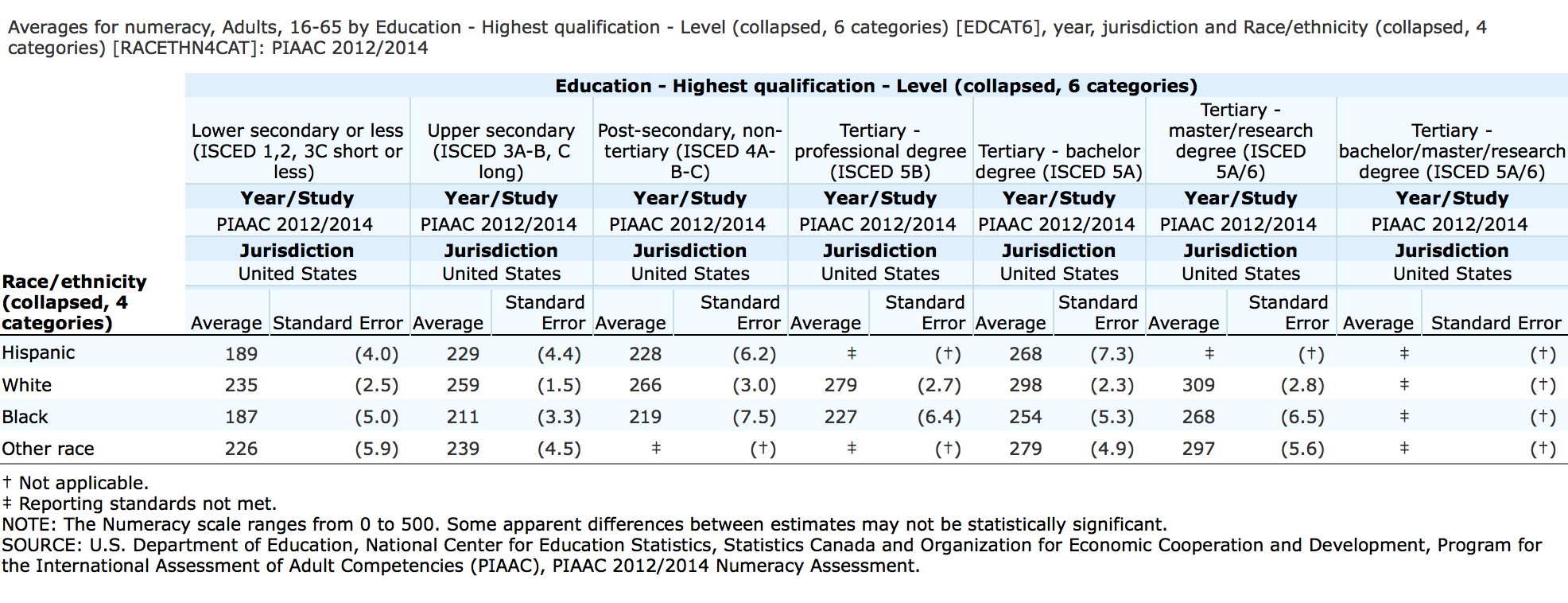 As you can see, in every education-group, there are large racial differences.
As you can see, in every education-group, there are large racial differences.
As you can see in this table, which also comes from the PIAAC, the same thing is true for literacy.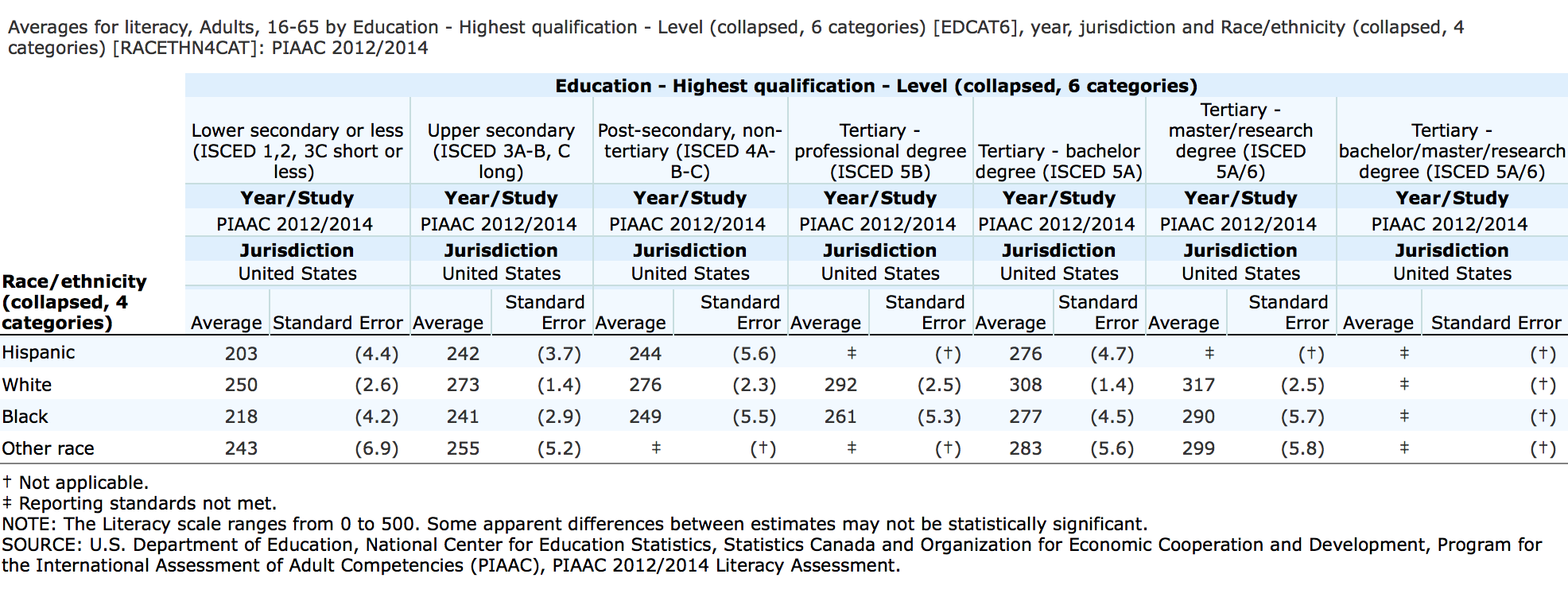 This means that, if you’re trying to detect racial bias (as Bertrand and Mullainathan tried to do in the study I mentioned above), controlling for education by using the highest degree obtained or years of schooling is inadequate, because it will produce estimates of racial bias that are biased upward. Yet countless social-scientific studies do exactly that, which has the advantage of making it more likely your study will be featured in the New York Times, but creates a misleading impression because it makes racial bias appear stronger than it really is. If there remains such large differences when you control for education, it’s not a stretch to think that differences also persist after you control for occupation, which local public officials may know about by experience.
This means that, if you’re trying to detect racial bias (as Bertrand and Mullainathan tried to do in the study I mentioned above), controlling for education by using the highest degree obtained or years of schooling is inadequate, because it will produce estimates of racial bias that are biased upward. Yet countless social-scientific studies do exactly that, which has the advantage of making it more likely your study will be featured in the New York Times, but creates a misleading impression because it makes racial bias appear stronger than it really is. If there remains such large differences when you control for education, it’s not a stretch to think that differences also persist after you control for occupation, which local public officials may know about by experience.
Perhaps more directly relevant to the study about discrimination by local government officials, there is also evidence that black people are less likely to complain when they are victim of consumer fraud, even controlling for a variety of variables.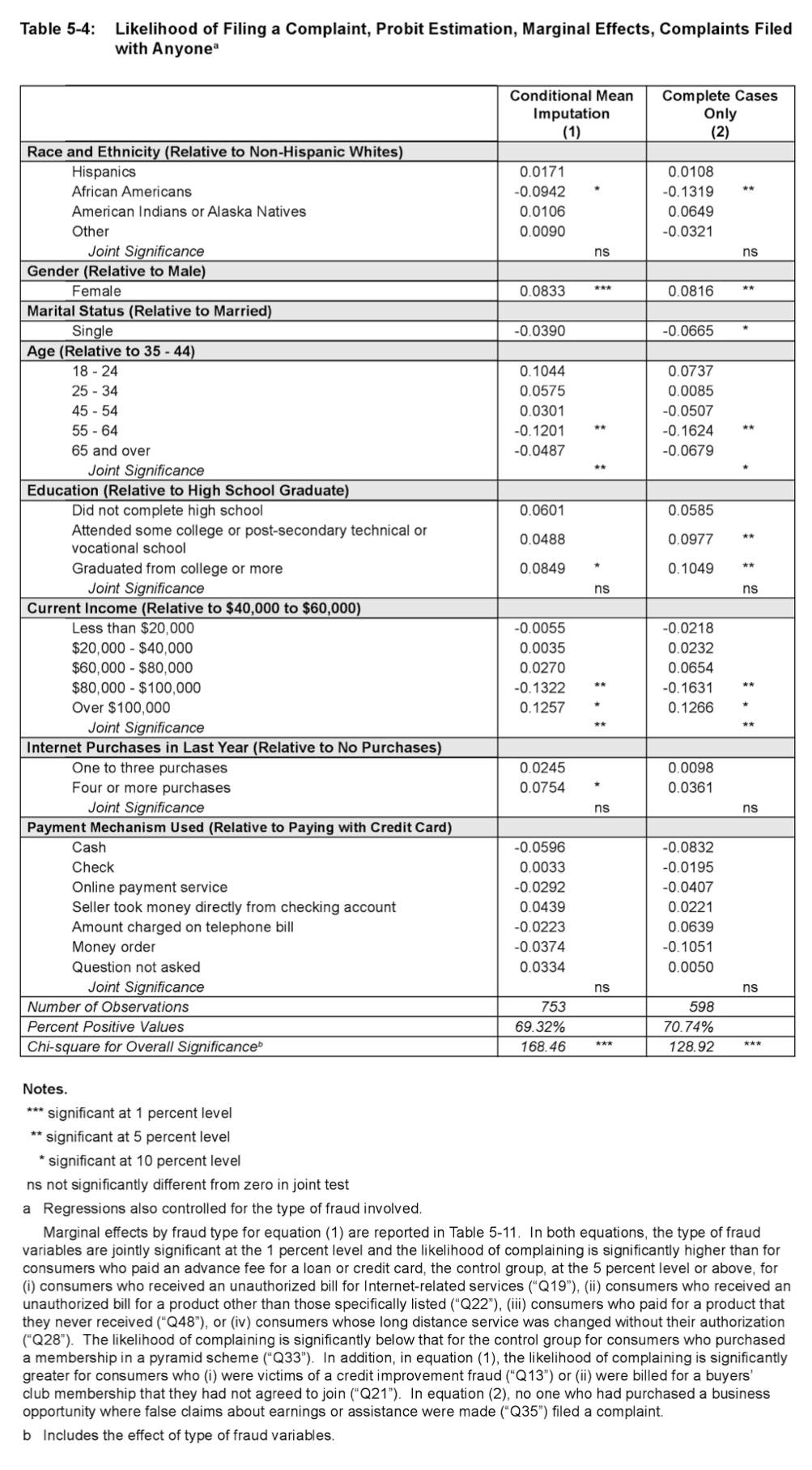 If the same thing is true for complaints about local government officials, and they know it, this could explain why they are more likely to ignore black people who email them, in which case it would have nothing to do with race per se. I could go on like that for a while, but this should be enough to convince you that it’s not easy to rule out the possibility that 2 explains part of the black/white difference in rate of reply observed in the study, because many differences between whites and blacks remain even after you control for a variety of variables. The authors seem aware of this problem which they mention in passing, but curiously ignore it after that, except in Appendix D where they provide a simple analytical framework to illustrate it but do not do anything to address it.
If the same thing is true for complaints about local government officials, and they know it, this could explain why they are more likely to ignore black people who email them, in which case it would have nothing to do with race per se. I could go on like that for a while, but this should be enough to convince you that it’s not easy to rule out the possibility that 2 explains part of the black/white difference in rate of reply observed in the study, because many differences between whites and blacks remain even after you control for a variety of variables. The authors seem aware of this problem which they mention in passing, but curiously ignore it after that, except in Appendix D where they provide a simple analytical framework to illustrate it but do not do anything to address it.
As we have seen, although the authors of that study added a signature indicating that the sender was a real estate agent in a second wave of emails, this intervention was inadequate to rule out 2, 3 or 4 as alternative explanations of their observations. But in order to test 3, they also used another strategy (which you may think can also be used to rule out 2 and 4), to which I now turn. Although they had no way to know the race of the recipient of the emails they sent to local public offices, they were able to use proxies, such as the proportion of blacks in the public workforce of each county, to estimate the probability that he was black. They reasoned that, if local government officials only used typically black names to infer race and not socio-economic status, the rate of reply to emails sent under the name “DeShawn” or “Tyrone” should not have increased as the probability that the recipient was black increased. On the other hand, according to this line of reasoning, if the difference in the rate at which people with typically black names and people with typically white names was driven by the inference about their race made by recipients, it should have been reduced as the probability that the recipient was black increased.
As you can see in this table, which reports the results of various regressions they performed to test 3, they found that the black/white difference in the rate of reply diminished as the probability that the recipient was black increased.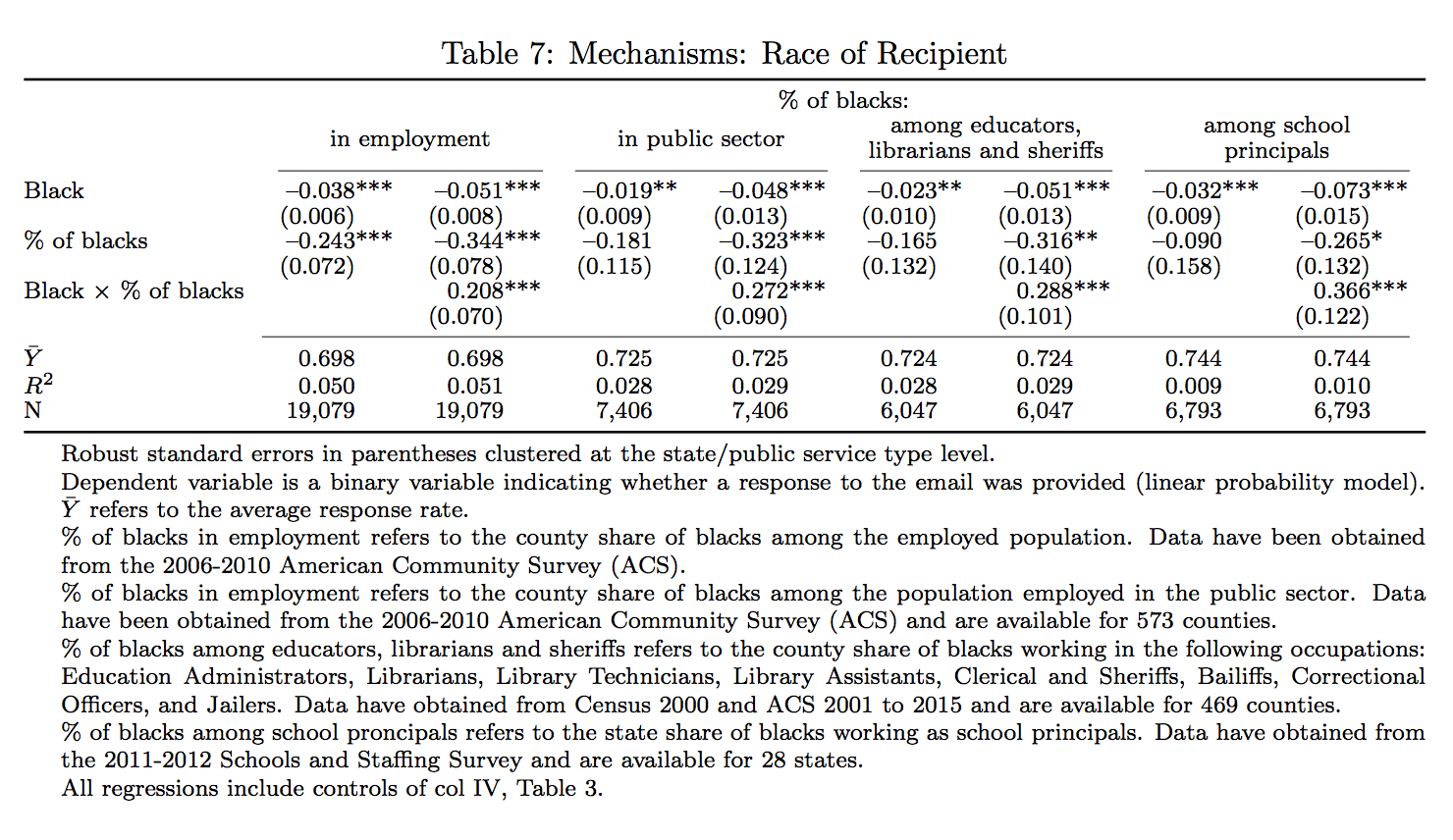 The coefficient of interest is the one for the interaction term Black x % of blacks, which as you can see is positive and significant no matter which method is used to estimate the probability that the recipient was black.
The coefficient of interest is the one for the interaction term Black x % of blacks, which as you can see is positive and significant no matter which method is used to estimate the probability that the recipient was black.
In the case where they knew the name of the recipient, they also used what is known about the distribution of names among whites and blacks to estimate the probability that the recipient was black/white, which led to the same conclusion.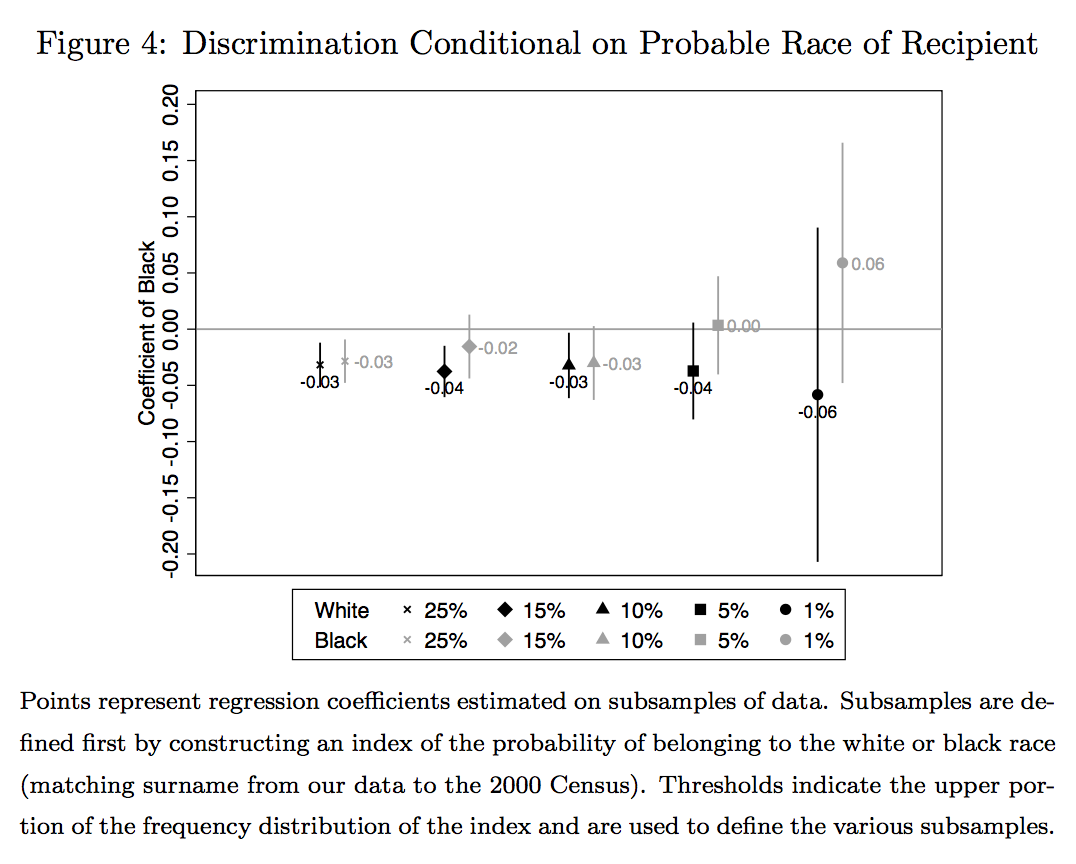 If you look at this graph, you see that the probability that black senders are discriminated against increases as the probability that the recipients is white increases and decreases as the probability that the recipient is black increases, although the estimates become less accurate because names that are strongly associated with one race or the other are less common. Note also that, according to this graph, black public officials seem to discriminate against white people at least as much as white public officials discriminate against black people and, in their case, this can’t be explained by class-based animus since the study used typically white names that aren’t associated with low socio-economic status.
If you look at this graph, you see that the probability that black senders are discriminated against increases as the probability that the recipients is white increases and decreases as the probability that the recipient is black increases, although the estimates become less accurate because names that are strongly associated with one race or the other are less common. Note also that, according to this graph, black public officials seem to discriminate against white people at least as much as white public officials discriminate against black people and, in their case, this can’t be explained by class-based animus since the study used typically white names that aren’t associated with low socio-economic status.
The authors of the study think these results are compatible with 1 but not with 3. However, they only rule out 2 and 3 if you assume that black public officials are just as likely as white public officials to engage in the kind of statistical discrimination these hypotheses posit, which is anything but obvious if only because black public officials are themselves black and presumably more likely to be lower-class than white public officials. Indeed, it seems likely that, even if blacks require more help, are less likely to complain when they are ignored, etc. even when controlling for socio-economic status, black public officials are less likely to engage in statistical discrimination against them on that ground than white public officials. Similarly, even if lower-class people require more help, are less likely to complain when they are ignored, etc., public officials who are themselves from a poor background are less likely to engage in statistical discrimination against them on that ground. Finally, the results found by the authors only rule out 4 if you assume that black public officials are just as likely as white public officials to harbor class-based animus, but again this is hardly obvious given that they are probably more likely to come from a poor background.
So these results are clearly insufficient to rule out 2, 3 and 4, but table 4 reveals a rather inconvenient fact, which neither the authors of the study nor Wolfers in his New York Times piece dwelt on. Indeed, if you look at the coefficient for % of blacks, you see that the proportion of blacks among local government officials is associated with a significant reduction in the probability of receiving a reply. In the case of blacks, this is mitigated by the fact that, as we have seen, the coefficient of the Black x % of blacks interaction term is positive, but even them seem less likely to receive a reply as the probability that the recipient is black increases. This relationship can be seen clearly in this graph.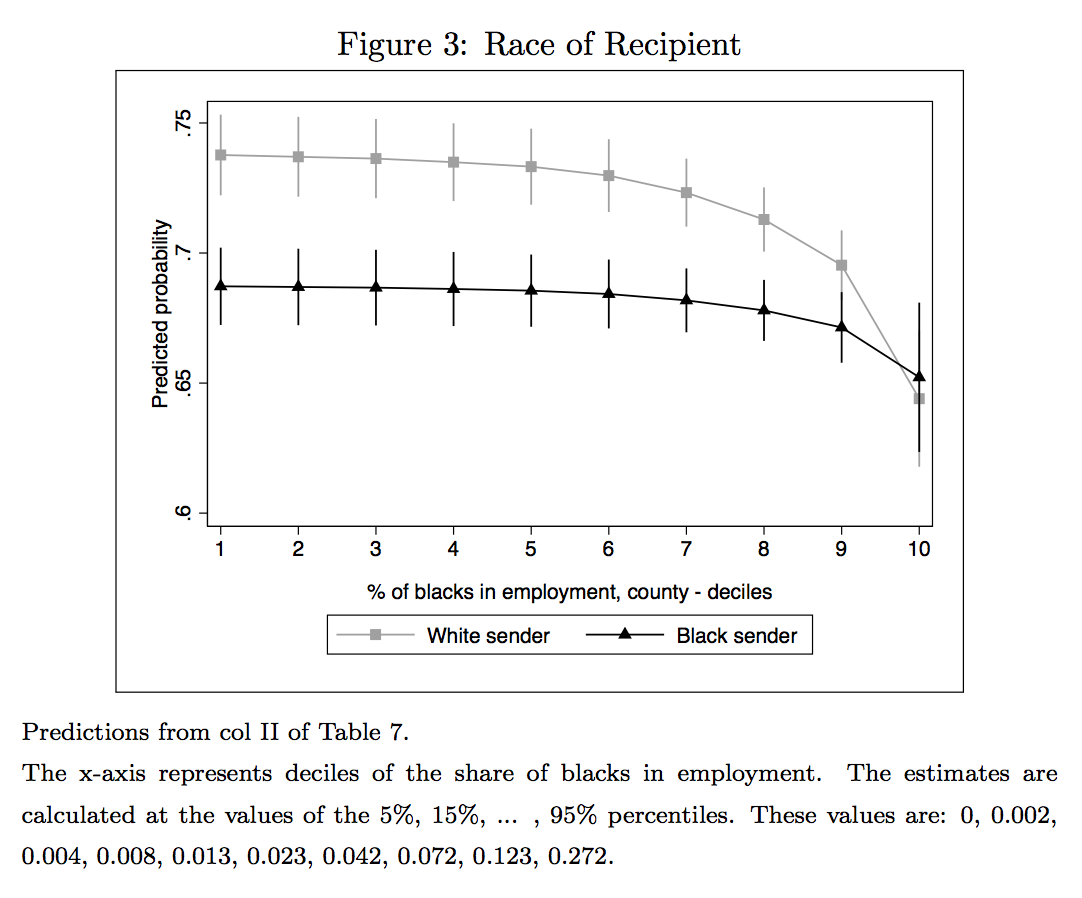 As you can see, if the black/white gap in the rate of response decreases as the probability that the recipient was black increases, it’s not because blacks become more likely to receive a reply, it’s because whites become less likely to receive one. Indeed, the graph suggests that everyone, regardless of their race, becomes less likely to receive a reply as the probability that the recipient is black increases, although the estimates also become more imprecise so we can’t know for sure. Thus, although the black/white gap decreases and quite possibly even reverses as the probability that the recipient was black increases, this doesn’t strike me as an improvement, but as Thatcher observed a long time ago in another context, I wouldn’t bet that everyone on the left agrees.
As you can see, if the black/white gap in the rate of response decreases as the probability that the recipient was black increases, it’s not because blacks become more likely to receive a reply, it’s because whites become less likely to receive one. Indeed, the graph suggests that everyone, regardless of their race, becomes less likely to receive a reply as the probability that the recipient is black increases, although the estimates also become more imprecise so we can’t know for sure. Thus, although the black/white gap decreases and quite possibly even reverses as the probability that the recipient was black increases, this doesn’t strike me as an improvement, but as Thatcher observed a long time ago in another context, I wouldn’t bet that everyone on the left agrees.
In conclusion, not only does this study only found a very small difference between the rates at which local government officials reply to people with names that are typically black/white, but it’s likely that part of this difference has nothing to do with racial bias per se but is explained by 2, 3 or 4 above. To be clear, I’m sure that some of the gap is explained by racial bias, though I have no idea how much. Nobody intelligent would deny that anti-black bias exists in contemporary US society, but I have never seen any convincing evidence that it explains very much relative to other factors and this study about discrimination by local government officials certainly doesn’t change that. On the other hand, as we have also seen, in some contexts black people benefit from a huge pro-black bias (such that no anti-black that even comes close has ever been found in social science), although it probably benefit mostly middle/upper middle-class blacks. American liberals just want racial bias to be strong and ubiquitous in the US, because they need that to be true to fuel their pathological guilt or whatever, but it just isn’t. This isn’t just a theoretical debate, it has practical implications. As I keep saying, if you mistakenly ascribe to racial bias a lot more explanatory power than it really has, you will inevitably focus your energy on policies designed to mitigate racial bias, when policies that focus on other, far more important factors would do a lot more good.
Is the sample size in the original survey big enough to distinguish between random non-responses on the part of the public bodies?
Asked another way, and in very non-stat-expert-language, In your section “we have at least four different possible explanations of the results found by that study:”
Is there a 5th option, namely that any two white (or black) names would generate a difference in response of 3.7% ? If two same race people emailed 100 officials, I wouldn’t expect perfectly similar responses…
Thanks
Yes, the authors sent several thousands of emails for each of the 4 names they used and, as they point out in the passage I quoted at the beginning of the post, the black/white difference was highly statistically significant.
I’m still not convinced that this is anything more than publication bias.
— PG.
The literature on that issue may be affected by publication, I don’t know, but it only makes sense to talk about publication bias if we’re talking about an entire body of literature, and here I’m just talking about one study.
“according to this graph, black public officials seem to discriminate against white people at least as much as white public officials discriminate against black people and, unlike in the case of the latter, this can’t be explained by class-based animus since the study used typically white names that aren’t associated with low socio-economic status”
Consistent with homophily then? A social network analysis is not required to notice how people sort themselves into “like” groups. Tribalism has the potential for unequal treatment of perceived out groups but effects like this aren’t necessarily a mark of sin unless the goal is to become perfectly neutral (simultaneously believing in the malleability of human nature to resolve unfavored outcomes and shared humanity to explain and justify favored group dynamics…)
There’s a tension between partiality and neutrality in the celebration of diversity if partiality has network effects favoring some groups and trapping others, even when there isn’t a significant out group animus.
Very interesting post. One thing that I would be curious to learn is if we can really compare the pro-black biases that exist in hiring practices at large legal firms and elite university admissions to the daily interactions that constitute public officials’ jobs? In the first case, firms and universities have explicit goals to promote diversity. Are there any studies that examine more “routine” interactions (where we would not expect the respondent to consciously consider the race of the individual) that show a pro-black bias?
Sorry I didn’t see your comment until now. I have no doubt that, if universities and large legal firms show a strong pro-black bias, it’s because promoting diversity is explicitly part of their goals, but my point is that many very important institutions share that goal, precisely because the US is not a white supremacy. As a result, insofar as middle-class/upper middle-class blacks are affected by bias, it mostly benefits them. Of course, the same thing probably cannot be said of most lower-class blacks, who have to face small anti-black biases in many of their interactions with other people (which is not to say it explains much compared to other factors), but are not in a position to benefit from pro-black bias since e. g. they will never apply to medical school. But people who promote the currently fashionable nonsense about “white supremacy”, despite their talk of “intersectionality”, are not intellectually well-equipped to understand that, precisely because they think race is this all-powerful force that explains everything.
Well written, except for one point in particular.
Segregation isn’t responsible for negroid failure, genetics are.
You see, Yellow River civilization was thriving and led to establishment of agriculture. China’s large population thus evolved, with its mandarin Confucian class at the helm, to support smaller bodies that consumed less but were fit for agricultural labor. Their lack of a high-protein diet, for example, made them susceptible to hunter-gatherer nomads from the North, i.e. the Xiongnu, Tanguts, Tatars, Mongols, etc.
Sub-saharan negroids, on the other hand, acquired food by running after it, typically without even a javelin or bow and arrow. The different geographical circumstances of West and East Africa led to being more adept at sprinting in the former and long-distance running in the latter. The temperate climate and lack of having to fight off advanced civilizations also meant that there were no evolutionary pressures to select for intelligence, unlike, say, Scandinavia where the cold and barren soil demanded selecting for intelligence to ensure survival.
This is why you see things like Europeans going to the moon while blacks living in filth, squalor, poverty, and ignorance everywhere in the world for all history pre-contact, and for the vast majority of time post-contact despite receiving more advancement and aid than any race has received in human history.
That’s why the 21 trillion spent since the Great Society has merely allowed black men to wander from their families, blacks continue to murder, rape, and rob, act disrespectful and speak horrible “English.” This fact can not only explain this 3.7% response gap, but is so extreme that it justifies and demands immediately expulsion from civilized lands from any person with a slightly functioning cranium devoid of Jewish poison, which is and has always been solely designed to protect their swindling. A society which can’t even voice its discontent with blatant, in-your-face negro savagery, certainly can’t figure out that the Yehudi have it by the balls.
That’s why the sort of gutless, faux-“controversial” pieces like this have to end up talking about absurdities like racial equality and redlining from FDR’s era being responsible for the current negroid problem.
I’m always very amused when someone who doesn’t even write under his real name accuses me of having no guts because I don’t say what he would like me to say…
I never claimed that segregation explained everything, and I didn’t even mention redlining under FDR, so you’re just making that up and attacking a strawman. What I said is that segregation explains a lot more than racism and I offered some evidence to support that claim.
(I note that, while for some reason you talked about how the lack of protein in the Chinese diet made them vulnerable to attacks by the Xiongnus, which doesn’t make any sense and in any case is completely irrelevant, you have totally ignored the evidence in question.)
There is a lot more evidence that segregation plays a significant role and, when I have more time, I will publish a detailed post in which I will discuss that evidence. You, on the other hand, have merely engaged in evidence-free speculation, replete with racist/antisemitic nonsense.
Here’s my real name, so you can drop that talking point (as if truth depends on who says it).
The plural of Xiongnu is Xiongnu, but the most fatuous simpleton should have been able to understand that I was talking about the effect of different (nomadic vs. sedentary/agricultural) lifestyles led to different evolutions of different peoples, which can explain something like a more apparently advanced culture (Han Chinese) succumbing to invasions from apparently less advanced cultures (which required proficiency in the saddle for survival, and included more meat-heavy diets, leading to stronger people, which is important in things like war….obviously).
I know you didn’t claim segregation explains everything, and I also know that it’s a shame that people like you have to tiptoe up to the edge of acceptable discourse and retreat away by blaming whitey, ultimately. 21 trillion spent since the Great Society, Section 8 housing, and roughly six million “we gotta help dem po blacks” programs being passed per day have failed to alleviate negroid failure, as you are surely aware. Osmosis of Whitey’s success does not translate to blacks, it just saps the former’s money and wrecks his community by the presence of the latter. Environmental determinism fails over and over and over and over and over again as an explanation for black failure, genetics shine out again and again and again and again, if a person has the balls to admit the obvious, which is a career-killer. This is why nobody cares to discuss results of things like the Minnesota Trans-Racial Adoption study or the implications of Raven’s progressive matrices, they do not produce the intended results.
But go ahead and say “racist” and “anti-semitic” and “nonsense” as you have been instructed to do for your own betterment, I can’t blame one person for refusing to stand up to the edifice of lies governing our society in any more than a superficial manner.
I never claimed that your anonymity had any bearing on the truth of what you were saying, but on your courage, which is ironic for someone who is calling me gutless. On that issue, am I supposed to believe that your name is “Shaxquavious Jackson”, really? Please. The truth is that you talk a lot of shit, but you’re still too scared to use your real name.
I may be a simpleton, but even assuming your claim is true (you don’t give any evidence whatsoever for the claim that nomadic people are physically stronger than sedentary people), I still don’t understand what your point about the effect of a nomadic vs. sedentary lifestyle has to do with any of what I’m talking about in this post.
Is the point that different lifestyles give rise to different evolutionary pressures? But nobody who knows even just a little bit about biology would deny that. The problem is that, if you actually knew what you were talking about, you would also know that the kind of “just-so stories” you use to predict that blacks are genetically inferior to whites with respect to intelligence don’t actually show anything.
Just because you rely on that kind of explanations, I have no doubt that I know the literature on the genetics of racial differences better than you, and will probably discuss that at some length here at some point, but the extent to which black/white differences in achievement are explained by genetic differences is irrelevant to the point I was making.
If you read carefully what I wrote in my post, which apparently is a lot to ask, you will see that I only talk about segregation because I want to give an example of something that people who want to reduce the black/white achievement gap could actually do, instead of focusing on bias. People can’t change genetics, but they can do something about segregation.
Now, as I already pointed out, there is plenty of evidence that segregation explains a substantial part of the black/white achievement gap. But you still haven’t addressed that evidence and I know you won’t.
Instead, you just offer ad hoc explanations based on the evolutionary pressures allegedly created by the “cold and barren soil” of Scandinavia, when you’re not talking about “negro savagery”, because you’re upset I didn’t write the post you wanted me to write and think it can only be because I’m under the influence of “Jewish poison”.
So do everyone a favor and stop pissing in my ears.